.
 |
|
Cultural barriers mire child abuse case
by Michael Kiefer -- Jan. 15, 2012, Arizona Republic News
They were charged with child abuse in fall 2009, months after their 8-year-old daughter was the victim of a gang rape that caused scandal in both Arizona and Africa.
But these Liberian immigrants have been lost in translation ever since, unable to go to trial or enter into a plea agreement because their tribal African language does not have words to describe the American justice system. It is a requirement of due process that defendants understand the charges against them and be able to assist their attorneys with their defense. |
On Thursday, the couple stood before a Maricopa County Superior Court commissioner tasked with determining whether they are competent to stand trial, a matter that in court parlance is known as a Rule 11 hearing. Competency usually has to do with mental health or intellect, or, in the case of children, whether they are mature enough to comprehend.
These are adults. He is 61; she is 50. Still, the court proceedings are beyond their cultural frame of reference.
“Rule 11 is not for the purpose of educating people from other countries,” said the prosecutor, Juli Warzynski. “Because of this, the state does not believe there is reason for the defendant not to stand trial for mental-health reasons.”
Indeed, the parents are not mentally ill. But there is still the matter of assisting their attorneys.
“They really don't understand what's going on,” said Gerald Gavin, who represents the father.
“There's no way she can help me in a trial,” said Sheri Lauritano, who represents the mother.
The Arizona Republic is not publishing the parents' names so as not to identify their child.
They speak an obscure tribal language called Seaside Grebo and come from war-torn Liberia in western Africa. The court has to call an interpreter in Minnesota and put him on speakerphone. But his service does not come close to the level of professionalism provided by the court's Spanish-language interpreters, who understand the workings and terminology of the court.
He sometimes chats with the parents in open court so that no one has any idea of what is being translated.
The gaps in understanding are evident in the simplest questions: When asked to state their names, both parents responded by saying, “I don't have any other name.”
And the cultural divide is enormous. The interpreter cautioned the Rule 11 commissioner that Grebo doesn't even have words for some of the legal concepts.
“How do you translate something there's no word for?” Gavin asked.
During the parents' last court hearing, in December, the mother lashed out verbally at the judge who ordered her to see a psychologist for evaluation.
“What's wrong with me that I have to go to the doctor?” she asked. “I'm not sick.”
Then she started clapping her hands and shouting, and her husband joined in shouting as well, reducing the courtroom to chaos.
On Thursday, they were given 45 more days to meet with the attorneys and the evaluators charged with “restoring” them to competency to see what they can do.
On July 16, 2009, four boys — all refugees from Liberia ranging in age from 9 to 14 — used a pack of gum to lure their 8-year-old victim to a storage closet at a west Phoenix apartment complex. The 14-year-old held her down as the four boys took turns sexually assaulting her, authorities said.
All were charged with kidnapping, sexual assault, sexual conduct with a minor and attempted sexual conduct with a minor.
The case set off shock waves, not only in Phoenix but across the U.S., prompting a visit from a Liberian ambassador to meet with local law-enforcement and the Liberian community in Phoenix.
But the youths were all adjudicated by June 2010, with little consequence. The oldest was sent to a juvenile treatment facility and will remain on probation at least until he is 18. The others were found incompetent to stand trial.
The charges against the parents came down in November 2009 and are unrelated to the sexual assault, except that they came to light over the course of the rape investigation. They are each charged with seven counts of child abuse, going back to 2007.
The girl was placed in foster care, though her parents are now granted visits with her.
|